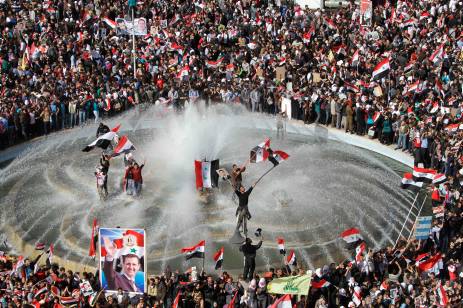
Saudi-Qatari Battle of Power over Syria

Local Editor
Divisions inside Syria's so-called "opposition" that had recently erupted during the past few days reflected a regional battle of power between two main axes; a Qatari-Turkish axis and the other a Saudi one close to US policy.
 This difference was manifested in the speech that Ahmad Maaz al-Khatib, Chief of the so-called opposition coalition, delivered at the Arab Summit held on Tuesday in Doha, where he slammed attempts of imposing custodianship on the opposition, and added, "Our people have paid the price of freedom, and their decision comes from their own interests and they refuse any custodianship."
This difference was manifested in the speech that Ahmad Maaz al-Khatib, Chief of the so-called opposition coalition, delivered at the Arab Summit held on Tuesday in Doha, where he slammed attempts of imposing custodianship on the opposition, and added, "Our people have paid the price of freedom, and their decision comes from their own interests and they refuse any custodianship."
Meanwhile, around 70 Syrian opposition members refused, in a statement sent to the summit, "the excluding control" of the Muslim Brotherhood movement in the so-called coalition.
On this note, Professor of Political Sciences in the American University of Paris, Ziad Majed stated, "There is a tight competition between two axes essential to the opposition's financial and military support; A Turkish-Qatari axis that supports the Muslim Brotherhood movement and a Saudi axis harmonious with the US."
Majed added in an interview with Agence France Presse, "This disagreement leaves its mark on the opposition's political structure and allegiances of difference military groups."
Moreover, Majed referred "to the severe discussion that took place in the recent coalition meeting in Istanbul last week, between supporters of forming a transitory government and those who want to replace it with an executive authority responsible for administrating the armed groups' territories."
"The disagreement was not on [the newly elected Prime Minister of the transitory government] Ghassan Hitto's character, but was rather a principle of whether to form the government or not in the first place," he underscored, emphasizing, "The US-Saudi axis preferred to take it easy in forming the transitory government, while the Qatari-Turkish axis was in a hurry to form it."
On another note, an opposition figure stated, "Saudis sent letters in many directions after Istanbul's meeting to express their dissatisfaction of Hitto's election, which drove the so-called Free Syrian Army to refuse admitting to it."
Moreover, insurgents in Darayya told the AFP that they might lose control over the city, after having run out of ammunition and weaponry, after the Syrian Army had surrounded the area for more than three months. Meanwhile, Maaz al-Khatib was publicizing his initiative for dialogue with the Syrian regime, when suddenly a flow of weaponry reached the surrounded area.
This meant that the weaponry was present at the border, and Turkey and Qatar, who were not satisfied with al-Khatib's proposal, chose to escalate matters and obstruct the initiative.
In the same context, an Arab expert on Syrian affairs listed different directions of funding and arming and different sources, and stated that the Qatari weaponry is being delivered to the extremist armed groups close to the Muslim Brotherhood via Turkey, while Saudis prefer to fund and arm the military councils that include dissidents from the Syrian Army.
Media, however, played a significant role in the unannounced conflict between the two axes, especially through Qatari al-Jazeera TV station, and the Saudi al-Arabiya TV station. Those who oppose Hitto and the "transitory government" could find al-Arabiya the suitable voice, while al-Jazeera focuses on the hospitability that Hitto was granted by the so-called FSA during his visit to Aleppo.
"The conflict is not limited to the current phase, but also to who would rule Syria after Syrian President Bashar al-Assad; The Muslim Brotherhood, as in Tunisia and Egypt, or others? Who will affect their foreign policies? Who will participate in reconstructing Syria and who will receive the most important investments there?" Majed concluded.
Source: al-Ahed News, translated and edited by moqawama.org



